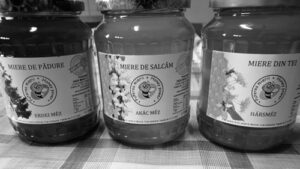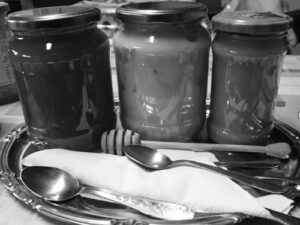When we were approaching Mr. Deák’s farm, more and more trailers and other industrial hardware started appearing. Upon arrival, I thought we had come to the wrong place, but after a phone call, Mr. Deák invited us into his workshop.
There, he had set up a table with his honeys, some bread and some refreshments. Next, we got to taste all his honeys, each having a specific taste and consistency. He seemed to be hospitable, and the atmosphere was relaxed.
He started beekeeping as a hobby, he spent 5-6 years learning how to do beekeeping, 10-15 years to become professional, and he has about 170 beehives.
He is making gradual investments, and he gets some support from the EU. In addition, he has a loan from a bank.
His bees produce honey from:
⦁ forest fruits
⦁ acacia
⦁ linden
⦁ spring flowers
⦁ rapeseed
He has bought a machine for extracting honey and he’s able to extract honey for other beekeepers too.
In this area, there are herbs in the fields and farmers let out their cows which disperse seeds. In general, there are few flowers in this area.
Before rapeseed was only grown in southern Romania, but it has spread northwards due to global heating. Winters are getting milder and summers hotter. There was more rain in the past, which was bad for honey production.
There are acacia forests near the Danube delta, and he follows the flowering of the acacia trees from the Danube delta northwards in the spring, extending the season about 3 weeks.
He’s guessing where it’s flowering the most and he’s moving the honeybees at night because they must not be overheated. If they get nervous, they move more and produce more heat. In addition, honeybees travel only short distances to find flowers.
He’s only selling honey products to consumers, and he has returning customers.
He’s the President of the Covasna County Beekeepers’ Association.
Quote: “The aim of Nectaria is to subject commercial producers and supermarket honeys of natural origin to quality control and professional evaluation, to appoint the Excellent Szekler Honey of the Year after organoleptic judging and top jury, and to reward honey producers in Szeklerland with prizes, medals and diplomas,” the organizers announced last year. At the same time, they support honey producers and promote their products, introduce beekeeping traditions and draw attention to the unique flavors inherent in the honeys of Szeklerland.
Regarding what this year has been like for honey producers, Mihály Deák said that it is impossible to generalize, it matters a lot whether with a little luck the beekeeper manages to be in the right place at the right time. All that can be said is that the hopes attached to acacia blooms could not be materialized when they were rolled out, but on average this year was slightly better than last year. Unquote. Source.
His son is studying mechanical engineering, father and son have a workshop where they build what their customers want in metal. Small things are built inside, while big ones are built outside. He can make things like a fruit press, tanks for farmers, etc., and he designs the structures by hand on paper. He works part-time as an administrator at a driving school and his son assists him with beekeeping.
A new building for 5 beekeepers will be finished next year, and they will sell honey together.
There are lots of hobby beekeepers, but the number of beekeepers is decreasing.
The price of honey can’t follow inflation because people won’t buy it, and the EU imports honey of poor quality from some other countries.


